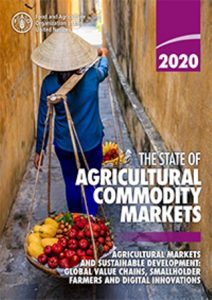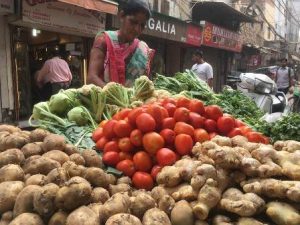Integrated Approach to Food Systems Required, Says FAO Report
We should leave no one behind in this rapidly transforming market environment. Smallholder farmers face many challenges that can undermine their attempts to farm and market their products effectively. Policies and mechanisms that support them in this regard will be indispensable to encourage their productivity and market participation
Agriculture is central to the 2030 Sustainable Development Agenda. It has linkages with food security, economic growth, employment and poverty eradication, the environment and  natural resource management, and nutrition and health are reflected in most of the Sustainable Development Goals (SDGs).Trade and markets lie at the heart of the development process. In food and agriculture, markets expand consumers’ choices and create incentives for farmers. Markets enable the optimal allocation of resources and provide the avenues, which link agriculture with other sectors of the economy. It makes markets crucial for the structural transformation of the economy. This edition of the Food and Agriculture Organisation’s The State of Agricultural Commodity Markets (SOCO 2020) focuses on how markets can bring us closer to achieving the 2030 Agenda for Sustainable Development. This report discusses policies and institutions that can promote economic growth and also harness agricultural and food markets to contribute towards sustainable outcomes – economic, social and environmental.
natural resource management, and nutrition and health are reflected in most of the Sustainable Development Goals (SDGs).Trade and markets lie at the heart of the development process. In food and agriculture, markets expand consumers’ choices and create incentives for farmers. Markets enable the optimal allocation of resources and provide the avenues, which link agriculture with other sectors of the economy. It makes markets crucial for the structural transformation of the economy. This edition of the Food and Agriculture Organisation’s The State of Agricultural Commodity Markets (SOCO 2020) focuses on how markets can bring us closer to achieving the 2030 Agenda for Sustainable Development. This report discusses policies and institutions that can promote economic growth and also harness agricultural and food markets to contribute towards sustainable outcomes – economic, social and environmental.
The SOCO 2020 presents commodity market issues in an objective and accessible way to policy makers, commodity market observers and stakeholders interested in agricultural commodity market developments and their impacts on countries at different levels of economic development. It offers a detailed analysis of the major global trends in agri-food markets and trade. It helps to identify how to reap economic, environmental and social gains and spur overall development. It makes an important contribution to the debate on how well-functioning markets can contribute to inclusive economic growth and sustainable development.
SOCO 2020 discusses policies, innovative mechanisms and digital innovations that can promote the participation of developing countries and smallholder farmers in global value chains.
Also Read : Climate Change and Cities: IRADe Develops Critical Assessment Framework
It also looks at policy responses to address the impacts of the COVID-19 pandemic on food value chains, both nationally and globally.
The role of well-functioning markets is significant in driving economic growth. However, the market mechanism cannot guarantee the provision of a range of social and environmental benefits that are central to sustainable development. In some instances, markets may fail to reconcile the interests of individuals with those of society as a whole. Moreover, they may also fail to support the needs of future generations, which are embedded in the 2030 Agenda for Sustainable Development.
The SOCO 2020 comes out at a crucial juncture for the global economy and the global food systems, as we join our efforts to contain the global pandemic triggered by the spread of COVID-19. The pandemic has clearly shown us that, in an interconnected world, diseases and the effects of measures taken to contain them spread rapidly over national borders. While the pandemic is not the central theme of this report, it highlights the close relationship between the production, consumption and trade of food. This fact underlines the importance of adopting an integrated approach to food systems and makes the release of SOCO 2020 even timelier.
 A central argument of this report is that well-functioning markets are key for development and economic growth. International trade can be a powerful instrument, and markets can be harnessed to foster sustainable economic, social and environmental outcomes. Global value chains can make it easier for developing countries to integrate into global markets. They also provide a mechanism to diffuse best practices to promote sustainable development, as they link food markets closely.
A central argument of this report is that well-functioning markets are key for development and economic growth. International trade can be a powerful instrument, and markets can be harnessed to foster sustainable economic, social and environmental outcomes. Global value chains can make it easier for developing countries to integrate into global markets. They also provide a mechanism to diffuse best practices to promote sustainable development, as they link food markets closely.
The report talks about the need to redouble efforts to include smallholder farmers in modern food value chains, thus securing rural incomes and food security in both rural and urban areas. We should leave no one behind in this rapidly transforming market environment. Smallholder farmers face many challenges that can undermine their attempts to farm and market their products effectively. Policies and mechanisms that support them in this regard will be indispensable to encourage their productivity and market participation.
With reference to digital technologies, the report says that they can help markets to function better and can improve farmers’ access to them. Innovations, such as food e-commerce, can benefit both farmers and consumers.
Advances in digital technology have improved communication between people and are having a profound impact on economies and societies.
Also Read : My aim is to inspire the SDGs dialogue: Grammy Award musician Ricky Kej
Better communication brings about cultural proximity which, in turn, affects consumers’ preferences for food. Moreover, as farmers and firms find it easier to communicate, they can better coordinate their operations across borders and become part of global value chains. However, to guarantee that the dividends of digital innovation are shared with the poorest, it is important to reduce the current digital divide. Nevertheless, it is difficult to foresee all the impacts that technological innovation could have on how we grow, process, trade and consumer food. Today, we know that further usage of technology can help us achieve significant gains in this area. At the same time, it is worth noting that some of the risks involved in technology adoption are not yet fully understood. We have to strengthen our joint efforts and ensure that the digital revolution reinforces development. SOCO 2020 makes it clear that we need to rely on markets as an integral part of the global food system. This is all the more important in the face of major disruptions, whether they come from COVID-19, locust outbreaks or climate change.
SOCO 2020 report estimates that about one-third of trade in food and agriculture takes place within global value chains and crosses borders at least twice, as primary commodities are initially exported to be processed into food products, which, in turn, are re-exported. It states that regional trade agreements can also contain clauses on competition policy, or standards harmonisation, resulting in policy reform and high levels of integration between the signatories. Although many view these agreements as building blocks of a global trading system, increased emphasis on regional trade should also be complemented by promoting multilateral trade to contribute to economic growth in countries, such as those located in sub-Saharan Africa, that trade mostly with global rather than regional partners.
